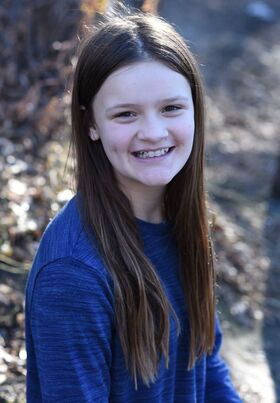|
Hadley is a shy but sweet teenager who loves her family, friends and especially her dog, Buddy. From the beginning, school hasn’t come easy to her. Her parents first noticed something was amiss in second grade when they’d try to do homework with her and she’d cry and beg not to do it. Her writing looked more like a toddler’s handwriting and she couldn’t seem to stay focused on the class material. Her parents were worried – they knew she was smart, yet she struggled in virtually every subject in school, especially reading and math. They were determined to get her the help she needed and began searching for answers. A full neurological evaluation yielded diagnoses of ADHD and Dyslexia.
In 7th grade, her parents made the difficult decision to pull her from the school she knew and send her to a private school that specialized in students with learning challenges. But after two years, they hadn’t seen much progress. Says her mother, Ali: “A lot of people told us that this school was going to change her life, but it hasn’t.” “At that point, we’d tried everything with very little improvement,” said Ali. “I had an epiphany that something had to be off in her brain that needs to be fixed at a base level. It felt as if her neurons weren’t firing, pathways were blocked. I couldn’t shake this belief that we had to find the root cause. Otherwise, we will just keep spinning our wheels, losing thousands of dollars in the process.” Not knowing what else do to, Ali turned to Google. “As I went down the Dr. Google rabbit hole, I learned about primitive reflex integration, something I’d never even heard of but sounded like it could be causing some of Hadley’s challenges. Eventually I came across A Chance To Grow.” She immediately emailed Kelly Pittman, Director of ACTG’s Neurotechnology services, and during their first discussion, she knew that she was on the right track. “Talking to Kelly that first time was so refreshing because she totally understood our plight, having dealt with this type of stuff both as a parent and professionally.” As she learned more about ACTG’s clinical services, Ali was shocked and disappointed that she’d never heard of the services that ACTG offers. “The holistic, natural, brain-based therapy made total sense to me. For the first time ever, I knew that we’d found a better path.” "For the first time ever, I knew that we’d found a better path.” First, Hadley began neurofeedback with Kelly to help her brain self-regulate more efficiently. “It’s very common for people to get stuck in a stress response on a daily basis,” says Kelly. “This can show up in a child’s behavior as “hypo” or “hyper,” either shut down or over-aroused. Neurofeedback addresses this, often improving social and emotional regulation along with academic skills.” Next up is Neuro Integrative therapy, an approach developed at ACTG that combines several interventions that collectively promote brain growth and social, physical and emotional development through purposeful movement. The goal is to establish efficient neurological connections between the brain and the systems of the body to improve higher-level functioning. Kelly also recommended that Hadley undergo functional auditory and vision screenings. These differ from the routine screenings where, when a child passes, it’s assumed that their hearing or vision is fine. But functional problems with eyes and ears that can seriously impede the ability to learn are not picked up by routine screenings. Says Ali, “I was floored to learn that vision played into learning as much as it does. We knew Hadley could read, but she still couldn’t comprehend. Now I know. Learning is 80% visual and if the eyes are misaligned or not tracking correctly, it can often be mistaken for ADHD and Dyslexia.” Hadley had a functional eye screening and sure enough, ACTG‘s testing found her eyes were a big part of her challenges. Due to her misaligned eyes, she’d skip words which heavily affected her comprehension. “As ACTG explained to me, she was having to work so hard just to stay aligned in reading words and lines, her brain wasn’t able to comprehend what she was reading. Hence, the enormous academic struggles. There is even speculation that Dyslexia might be a misdiagnosis all together.” Hadley was also diagnosed with an auditory processing disorder (APD), which affects the ability to understand speech. Someone with APD might be able to hear well, but the auditory input is not correctly interpreted by the brain.
Although happy that she finally has answers that make sense, she wonders why it took her so long to find ACTG. “Never once in all of these years did a doctor say anything about brain-based therapies,” Ali says, the doctors just recommended medication. “I don’t understand why the medical community couldn’t or wouldn’t tell me about these other therapies and methods.” Hadley is 13 now, and if Ali and her husband had known about ACTG and their brain-based approach years ago, it might have changed the trajectory of her life. "I hope anyone who is on their own neuro-diverse struggle finds ACTG. It’s the best-kept secret and I want everyone to know about it." Now Ali wants to make sure that people who have neuro-diverse family members are aware of it. “I hope anyone who is on their own neuro-diverse struggle finds ACTG. It’s the best-kept secret and I want everyone to know about it. They truly want to help Hadley reach her full potential and I’m confident we’re in the right spot now, but even more than confident, I am so, so grateful.”
> Click here to be redirected back to our Spring '23 Newsletter
0 Comments
Leave a Reply. |
success story category:
All
WE LOVE HEARING FROM YOU! |


